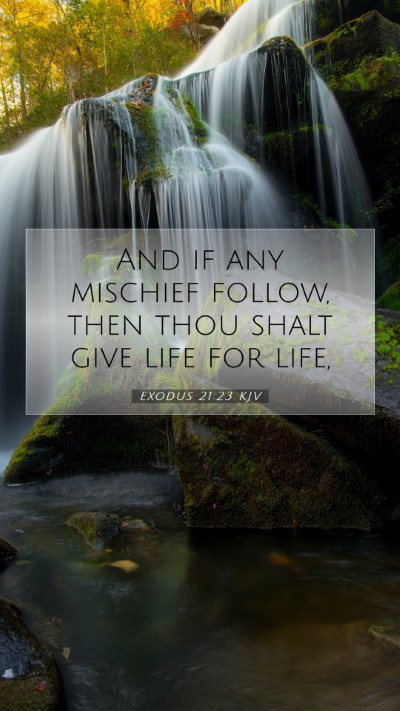Understanding Exodus 21:23
Exodus 21:23 states:
"But if there is serious injury, you are to take life for life, eye for eye, tooth for tooth, hand for hand, foot for foot."
This verse is a part of the Mosaic Law, emphasizing justice and equitable retribution in the context of personal injury. Below, we delve into the significance and interpretation of this verse, drawing insights from esteemed public domain commentaries.
Context of Exodus 21:23
Exodus 21 as a whole deals with laws pertaining to personal injuries, slavery, and various social justice issues crucial to the Israelite community. The backdrop of this specific verse involves the intention to uphold justice while limiting vengeance in society.
Commentary Insights
-
Matthew Henry's Commentary:
Henry emphasizes that this law is founded on the principle of justice and equity. The intention is to establish a standard that does not permit personal revenge, but rather seeks to limit punishment to what is proportional to the offense committed.
-
Albert Barnes' Notes on the Bible:
Barnes discusses the significance of the "lex talionis" or law of retaliation, which serves as a guide for judges in making fair decisions. He highlights that this law is more about societal order than about personal vendettas, ensuring that a person does not suffer more than what their actions have caused.
-
Adam Clarke's Commentary:
Clarke elaborates on the idea of “an eye for an eye” as a precept governing civil society. It is meant to restrain further violence and maintain peace by avoiding escalation. He notes that the law was not to be applied in a literal sense, but was designed to establish a principle of equitable recompense.
The Principle of Justice
This verse illustrates the Biblical principle that punishment should be proportional to the offense. The significance of “life for life, eye for eye” can be seen as both a deterrent and defining a clear boundary in legal matters within the community.
Broader Biblical Context
Exodus 21:23 connects with several other teachings across Scripture which emphasize justice and mercy:
- Leviticus 24:19-20: Reinforces the principle of equal retribution.
- Matthew 5:38-39: Jesus reframes this law, advocating for mercy over retaliation.
- Romans 12:19: Encourages individuals to leave vengeance to God, promoting forgiveness instead.
Application for Today
Understanding Exodus 21:23 can influence modern readers in the following ways:
- In our interactions, we are urged to practice justice tempered with mercy.
- This verse challenges us to think deeply about fairness and the consequences of our actions.
- In societal contexts, it prompts a reflection on legal systems and the importance of equitable laws.
Conclusion
In summary, Exodus 21:23 encapsulates essential truths about justice that resonate through time. As individuals engage with this verse, they can draw valuable insights that aid in forming a compassionate and just society. Whether in personal conduct, legal matters, or social justice, the teachings derived from this Biblical law encourage ethical reflection and equitable solutions.
Further Study
If you’re interested in exploring more about Biblical laws and principles, consider joining Bible study groups or utilizing online Bible study tools. Resources such as Bible study guides and Bible study lessons can help deepen your understanding of Scripture.


